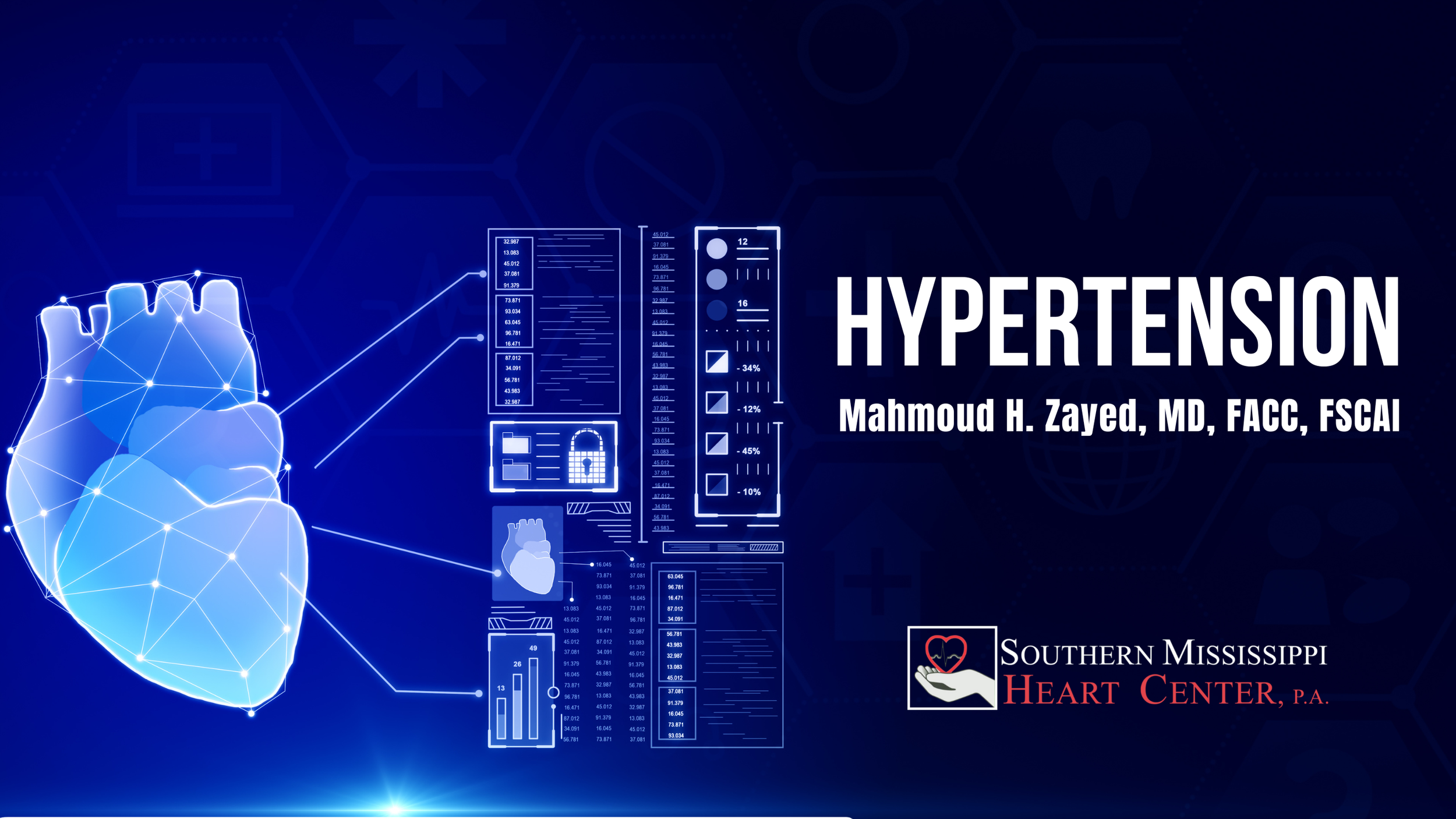
Patient Education
SMHC PATIENT EDUCATIONAL MEDIA
At Southern Mississippi Heart Center, we believe it’s important that the Mississippi Gulf Coast stays informed about heart health. Our doctors strive to educate communities about new discoveries and scientific research pertaining to cardiology.
-
There are several ways to reduce your risk of developing coronary heart diseases (CHD), such as lowering your blood pressure and cholesterol levels. Here are some general lifestyle changes one can make for a healthier heart:
· Eat a healthy, balanced diet
· Be more physically active
· Keep to a healthy weight
· Give up smoking
· Reduce your alcohol consumption
· Keep your blood pressure under control
· Keep your diabetes under control
· Take any prescribed medicine
-
Sometimes heart disease may be “silent” and not diagnosed until a person experiences signs or symptoms of a heart attack, heart failure, or an arrhythmia. When these events happen, symptoms may include the following:
Heart attack: Chest pain or discomfort, upper back or neck pain, indigestion, heartburn, nausea or vomiting, extreme fatigue, upper body discomfort, dizziness, and shortness of breath.
Arrhythmia: Fluttering feelings in the chest (palpitations).
Heart failure: Shortness of breath, fatigue, or swelling of the feet, ankles, legs, abdomen, or neck veins.
-
The only way to know if you have high blood pressure (HBP, or hypertension) is to have your blood pressure tested. Understanding your results is key to controlling high blood pressure.
The five blood pressure ranges as recognized by the American Heart Association are:
Normal
Blood pressure numbers of less than 120/80 mm Hg are considered within the normal range. If your results fall into this category, stick with heart-healthy habits like following a balanced diet and getting regular exercise.
Elevated
Elevated blood pressure is when readings consistently range from 120-129 systolic and less than 80 mm Hg diastolic. People with elevated blood pressure are likely to develop high blood pressure unless steps are taken to control the condition.
Hypertension Stage 1
Hypertension Stage 1 is when blood pressure consistently ranges from 130-139 systolic or 80-89 mm Hg diastolic. At this stage of high blood pressure, doctors are likely to prescribe lifestyle changes and may consider adding blood pressure medication based on your risk of atherosclerotic cardiovascular disease (ASCVD), such as heart attack or stroke.
Hypertension Stage 2
Hypertension Stage 2 is when blood pressure consistently ranges at 140/90 mm Hg or higher. At this stage of high blood pressure, doctors are likely to prescribe a combination of blood pressure medications and lifestyle changes.
Hypertensive crisis
This stage of high blood pressure requires medical attention. If your blood pressure readings suddenly exceed 180/120 mm Hg, wait five minutes and then test your blood pressure again. If your readings are still unusually high, contact your doctor immediately. You could be experiencing a hypertensive crisis.
If your blood pressure is higher than 180/120 mm Hg and you are experiencing signs of possible organ damage such as chest pain, shortness of breath, back pain, numbness/weakness, change in vision or difficulty speaking, do not wait to see if your pressure comes down on its own. Call 911.
-
Long-term high cholesterol is one of the leading causes of heart disease. Prescribed medication improves levels, but healthy lifestyle changes are the best way to lower cholesterol levels. Here are some ways you can reduce your cholesterol.
· Eat heart-healthy foods
· Exercise and increase your physical activity
· Lose weight
· Quit Tobacco
· Drink alcohol in moderation -
Nutrition and wellness play a crucial role in maintaining a healthy heart. Eating a diet rich in fruits, vegetables, whole grains, and lean protein, while limiting saturated and trans fats, can help lower cholesterol and reduce the risk of heart disease. Regular physical activity, maintaining a healthy weight, and not smoking can also help promote cardiovascular health.
Additionally, managing stress through techniques such as yoga, meditation, and deep breathing can also have a positive impact on overall heart health. A combination of a healthy diet and lifestyle, regular check-ups and screenings, and working with a healthcare professional can help prevent and manage heart disease.
-
Stress and depression are closely linked to heart health. Chronic stress can lead to high blood pressure, heart disease, and other cardiovascular problems. It's important to manage stress through healthy coping mechanisms, such as exercise, meditation, deep breathing, and other relaxation techniques.
Depression is also a risk factor for heart disease, which is why it's important to screen for depression as part of a comprehensive cardiovascular evaluation. Screening tools such as questionnaires, self-assessments, and interviews can help identify individuals who may be at risk for depression. Early identification and treatment of depression can improve overall cardiovascular health and reduce the risk of heart disease.
At Southern Mississippi Heart Center, we understand the importance of stress management and depression screening in maintaining heart health, which is why we offer these services as part of our comprehensive cardiovascular care.
It's never too early to learn about heart health! We were delighted that one of our Nurse Practitioners, Elizabeth Drummond, FNP, AGACNP, presented to St. Alphonsus Catholic School’s kindergarten class in Ocean Springs about the importance of our hearts and ways to care for them. Thank you to the teachers, administration, and of course, the students!
Heart disease is the #1 killer of both men and women in the United States. More than half a million people die of heart disease each year. This astounding number is more than the number of people dying from all forms of cancer combined. Unfortunately, our state of Mississippi ranks #1 in deaths attributed to heart disease for both men and women.
We must work together to try and prevent heart disease from taking away our loved ones. Since the likelihood of a person having heart disease depends on whether they have risk factors that increase the risk, it makes sense that reducing the number of risk factors decreases the chance of having a heart attack. If this person has already experienced a heart attack, the risk of a second heart attack is significantly increased.








